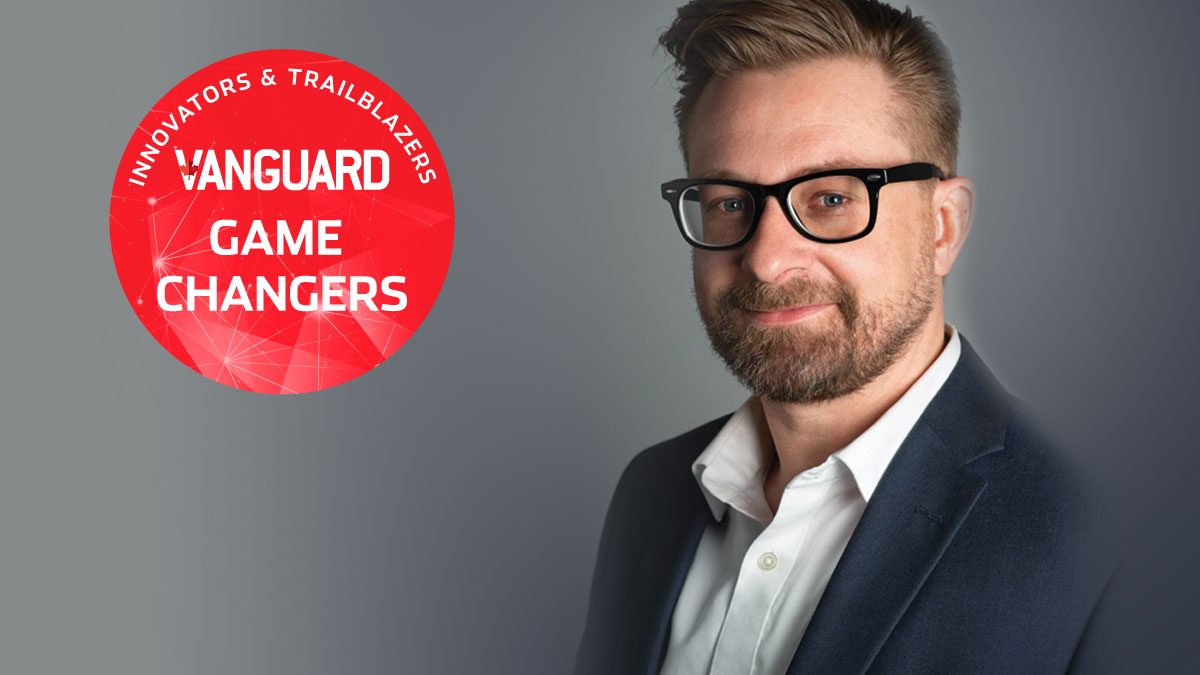Chris Bartlett is the president of CCX Technologies, a company that provides full end-to-end, onboard cybersecurity for networks on vehicles involved in air, land and sea missions. Bartlett said that while working on airborne connectivity systems, it became clear to them that cybersecurity presented a significant risk. A risk that requires “a more comprehensive solution than just adding a firewall to the aircraft network, or trying to fit a terrestrial cybersecurity solution onto an aircraft.”

CCX Technologies has grown exponentially in the last two years driven by a relatively small team of aviation and defence professionals. As president, Bartlett is responsible for day-to-day operations, sales, marketing and business development. “Pretty much anything that is not engineering related,” he said.
Due to his work in the security and defence field, Chris Bartlett was selected as a Vanguard Game Changer for the February/March 2020 issue. Here is the full interview with him.
What was your most challenging moment?
Every day has its challenging moments, and with a startup company, my next challenge is the most challenging. We are in the position of having an abundance of work with a small engineering team. As a startup company in a complex ecosystem, you have high hurdles to jump. You get told “no” or “you’re too small” every day. Despite the challenges, we have customers, who are leaders in their fields, who trust us.
The cybersecurity market is changing so rapidly, that sometimes, the two and a half years we’ve been building our solutions seems like an incredibly long time – but at the same time, just a moment.
What was your “aha” moment or epiphany that you think will resonate most with our reader? Tell us that story.
We had this idea, which as far as we could tell did not exist for the aviation and defence industry. We wanted to build cybersecurity systems to actively monitor onboard networks and databuses right on vehicles involved in air, land and sea activities. Our “aha” moment was when a customer, a heavyweight in the aviation industry, validated our idea by giving us a contract. This large company recognized the need for cybersecurity, but couldn’t execute. But now, the largest companies in defence and aviation are coming to us.
What is the one thing that has you most fired up today?
Growing a small cybersecurity technology company in Canada that competes in a very complex global market segment and providing leading edge cybersecurity technology to the largest defence and aviation companies in the world – that gets me fired up!
What is the best advice you received?
Your customers, current and prospective, are your best source of product and development funding. Small or medium-sized companies often go after major funding rounds to grow. While they’re doing this, they aren’t putting the same amount of effort into going after customers and partnering with them, which is a great way to grow the company’s capabilities and revenues.
What is a habit that contributes to your success?
Thinking creatively and holistically about business and technology – how do we challenge the norm and do business differently? Not for the sake of trying to be different, but for the purpose of achieving more than if we did not challenge the norms.
What people or organizations do you believe best embody the innovation mindset?
Innovation can mean a number of things. When a large company recognizes that CCX Technologies can provide a solution, that’s innovation within the context of what is a structured, organized, large company. From our perspective, that’s innovation at its best – a company or organization thinking differently about how they want to acquire new solutions.
How is your organization changing the game within your industry sector?
As far as we know, there is no company trying to solve the onboard cybersecurity problem with a full solution that is installed on defence vehicles. When we started, we wanted to be the company that provides full end-to-end, onboard cybersecurity for networks on vehicles involved in air, land and sea missions. And now we do just that. We create hardware, software and tools designed for cybersecurity professionals to improve the security posture of the onboard network and databuses.
What are some of the biggest impediments to innovation in your industry sector?
A key impediment to innovation is the lack of understanding of cybersecurity threats. Particularly because aviation and defence are traditional industry sectors, change is slow because it’s highly regulated with strict requirements for compliance. While important for safety reasons, regulatory requirements can naturally quash innovation.
How has innovation become engrained in your organization’s culture, and how is it being optimized?
Essentially, we have to innovate or we will cease to exist. One of our biggest assets is our ability to consistently deliver on our innovative ideas. We challenge everyone at CCX Technologies to think differently about problem solving and we foster innovations on how to do your job, new processes, ideas, and execution.
What technologies, business models, and trends will drive the biggest changes in your industry over the next two years?
There are many, but two that come to mind immediately are: Observing the implementation of the U.S. DoD’s JEDI (Joint Enterprise Defense Infrastructure) program, which will see the deployment of a “worldwide, highly available, exponentially elastic, secure, resilient cloud computing and storage environment that seamlessly extends from the homefront to the tactical edge.” This program opens the door for CCX and our technology, which is designed to fit this model. Secondly, industry and government collaboration to address the issues of cybersecurity. CADSI recently published “The Cyber Collaboration Imperative: An Overview of Leading Industry Collaboration Models Practices in Cyber Defence” which is a proposal for change here in Canada for public-private collaboration on cyber defence. If the government embraced some of the recommendations in the report, it would also drive a massive change in our industry sector.
What is your parting piece of advice?
The advice I would give to anyone operating a vehicle is that monitoring your onboard network for cybersecurity issues is no longer optional. You need to know what’s going on in your onboard vehicle networks at all times.
Why is this good advice? For any defence related aircraft, ship, or land vehicle, the consequences of an onboard cybersecurity event can have national implications. It could impact outcomes of events such as peacekeeping missions, wars and even national sovereignty. There are also human lives at stake – soldiers that strap themselves into vehicles without knowing if the onboard network has been breached or not. The pain of fixing a cybersecurity breach will be far more costly than preparing in advance for the eventuality that a breach will happen.

